With just under six weeks to go until the 2023 Rugby World Cup kicks off in Paris, we're looking back at the history of the tournament, from its origins in New Zealand and Australia 36 years ago, to its tenth instalment in France this September.
This weekend we're looking back at the 1999 renewal.
Wales were the hosts for the tournament, which, for the first time, consisted of 20 teams, up from 16 in the previous three editions.
The Webb Ellis Cup remained in the southern hemisphere with Australia getting the better of France in the final, the Wallabies claiming their second title.
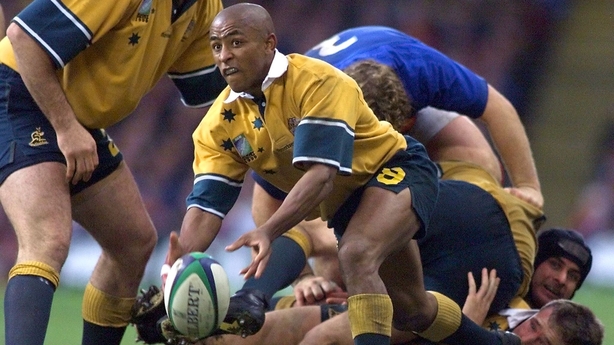
The Hosts
The tournament returned to the northern hemisphere again after the success of the 1995 version in South Africa and the pool games were spread across host-nation Wales, Ireland, England, Scotland and France.
As well as Lansdowne Road, Ravenhill (Australia v Romania) and Thomond Park (Australia v United States) hosted games in Ireland's pool.
Glasgow’s Hampden Park was also used for South Africa’s game against Uruguay in Pool A.
Built especially for the World Cup, Cardiff’s Millennium Stadium, with a capacity of 72,500, hosted the final.
The additional four teams added to the competition meant that quarter-final play-offs were needed. It consisted of three matches between the second-place teams from each pool and the best third-place team.
Famously, Ireland lost their knock-out match against Argentina in Lens. It was the first and last time that the round was used.
Pools
Pool A: South Africa, Scotland, Spain, Uruguay
Pool B: New Zealand, England, Italy, Tonga
Pool C: France, Fiji, Canada, Namibia
Pool D: Wales, Argentina, Samoa, Japan
Pool E: Ireland, Australia, United States, Romania
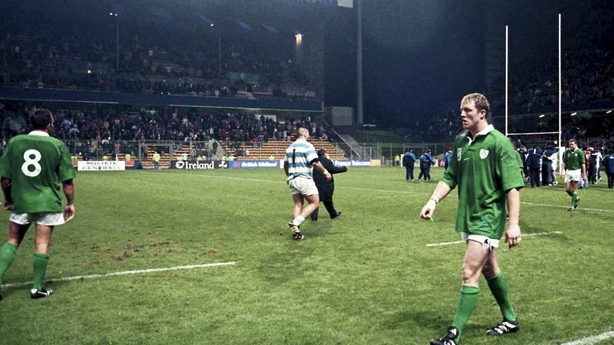
Ireland
In the pantheon of dark days in the Rugby World Cup for Ireland, Lens stands out.
A vain attempt at a 13-man lineout close to the Pumas line at the death yielded little but a stark image of a devastating defeat.
Argentina had never beaten Ireland before and the 28-24 loss in a play-off hurt even more with a home quarter-final against France awaiting.
Having lost to a late penalty in their Five Nations meeting earlier in the year, Ireland, under head coach Warren Gatland, would have relished a second shot.
Ireland had 1997 series-winning Lions Keith Wood, Eric Miller, Paul Wallace and Jeremy Davidson in their squad, while a 20-year-old Brian O’Driscoll was included after making his debut against Australia during the summer.
David Humphries kicked seven penalties and dropped a goal to give Ireland a 24-18 lead, with Argentina out-half Gonzalo Quesada kicking all the Pumas’ scores.
But Argentina struck in the 74th minute, winger Diego Albanese diving over for the game’s only try; Quesada converted and then added a penalty but Ireland had six minutes of overtime to come up with a winning score.
A series of penalties and two 13-man lineouts couldn’t break the line and the South Americans held out to hand Ireland an infamous defeat.
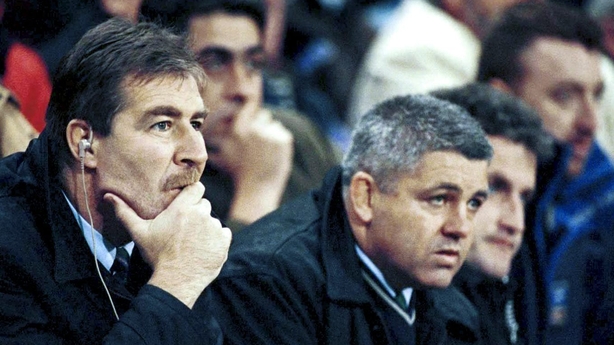
"Probably the worst I've ever felt after a rugby match. A bitter pill and a serious low," said O’Driscoll later.
The pool stages had gone largely as expected.
Wood became the second Ireland player, after Brian Robinson in 1991, to score four tries in a World Cup match during the 53-8 drubbing of the United States in Lansdowne Road, while they rounded off the group by beating Romania 44-14, helped by a brace of tries from Conor O’Shea.
In between came the battle against eventual winners Australia.
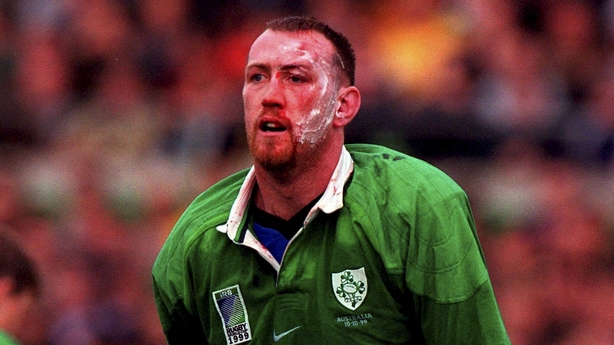
Ireland lost a bruising match 23-3 and Trevor Brennan was cited and suspended for two matches following a dust-up with Toutai Kefu. It was a tough double blow but nothing in comparison to what was to unfold ten days later in northern France.
Ireland squad: Keith Wood, Ross Nesdale, Paul Wallace, Peter Clohessy, Reggie Corrigan, Justin Fitzpatrick, Angus McKeen, Paddy Johns, Jeremy Davidson, Malcolm O'Kelly, Bob Casey, Eric Miller, David Corkery, Trevor Brennan, Andy Ward, Kieron Dawson, Dion O'Cuinneagain (capt); Brian O'Meara, Tom Tierney, Eric Elwood, David Humphreys, Gordon D'Arcy, Brian O'Driscoll, Kevin Maggs, Jonny Bell, Mike Mullins, Justin Bishop, James Topping, Matt Mostyn, Conor O'Shea.
Results
Pool E: Ireland 53-8 United States (2 October – Lansdowne Road, Dublin)
Pool E: Ireland 3-23 Australia (10 October – Lansdowne Road, Dublin)
Pool E: Ireland 44-14 Romania (15 October – Lansdowne Road, Dublin)
QF play-off: Argentina 28-24 Ireland (20 October – Stade Felix Bollaert, Lens)
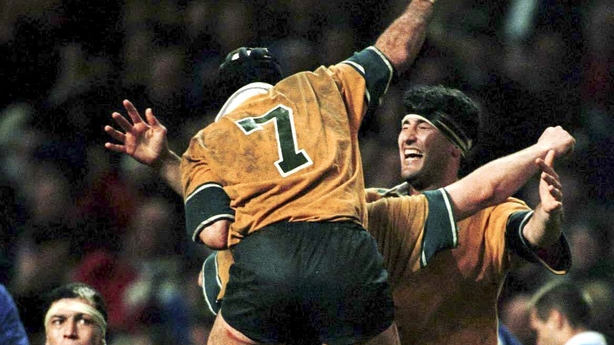
"The All Blacks were the favourites, the Springboks were defending champions and England were the great local hope," Australia skipper John Eales said later. "So the limelight was off us a bit and we were able to prepare quietly and save our best for last."
Unusually, the 1999 Rugby World Cup is more commonly remembered for a semi-final rather than the decider.
The final between Australia and France is something of an afterthought for many, with the obvious exception of the victorious Wallabies.
Les Bleus' incredible semi-final victory over New Zealand, when they overturned a 14-point deficit against the overwhelming favourites, stands as one of the greatest international Tests played, the jeopardy involved in the result raised the game to an even higher plane.
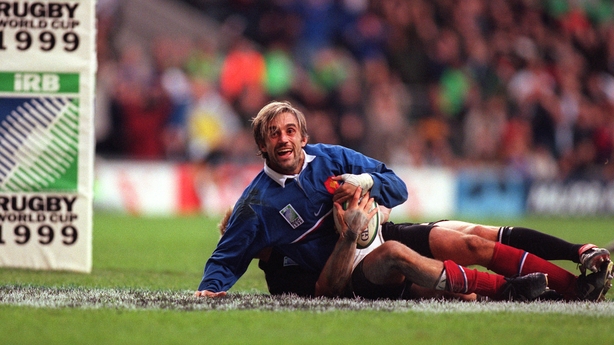
The sight of Philippe Bernat-Salles celebrating their clinching try with six minutes to play is the standout moment.
France, under head coach Jean-Claude Skrela, had topped Pool C after wins over Fiji, Canada and Namibia. That secured a quarter-final in Dublin against Argentina and although the Pumas recovered to trail by just four points with 10 minutes to play, France scored 17 unanswered points to progress.
John Hart’s New Zealand, meanwhile, beat England, Tonga and Italy in the group stages before accounting for Scotland, 30-18, in Murrayfield in the quarter-final.
Beaten finalists in 1995, the All Blacks, with Jonah Lomu helping himself to six tries before the semi-final, were on a mission.
They could boast Josh Kronfeld, Andrew Mehrtens, Christian Cullen, Tana Umaga and Jeff Wilson in their ranks, and looked unstoppable.
After finishing bottom of that season’s Five Nations, France had steadily made their way into the last four.
The underdogs actually led in Twickenham until the 24th minute when Lomu scored a trademark try, barging through a bevy of semi-interested tacklers.
He added a similar effort after the break to hand the 1987 champions a healthy two-score lead.
The final half-hour, however, unfolded like a car crash in slow-motion for New Zealand. Christophe Lamaison kicked two penalties before a three-try salvo won the game.
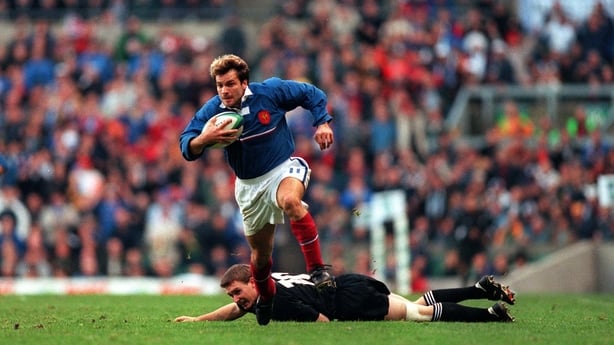
Christophe Dominici, Richard Dourthe and Bernat-Salles all applied the finishing touches to kicked assists to seal a famous victory.
On the other side of the draw, Australia, champions in 1991, claimed three wins from three in Ireland's pool before a quarter-final victory over Wales.
They needed extra time to see off England’s quarter-final conquerors South Africa in the semi-final with Stephen Larkham’s dropgoal the crucial score as Matthew Burke kicked eight penalties in a 27-21 win.
The final itself was not a classic but as France captain Rafael Ibanez conceded afterwards, an "arm wrestle we lost mentally, lost physically...we didn’t have enough strength or stamina to beat Australia".
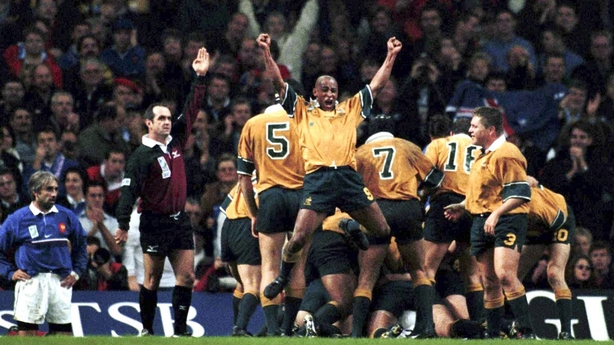
Burke scored seven penalties and two conversions in the 35-12 win, while the last of France and Lamaison’s scores came via a penalty in the 60th minute to make it 18-12.
Tries from Ben Tune and Owen Finnegan allowed Australia, under head coach Rod Macqueen, the breathing space to soak up the winning feeling before the final whistle.
Eales and Tim Horan both picked up their second winners’ medals, while George Gregan and Larkham were prominent throughout the campaign. It marked the start of a golden age for the team who went on to claim two high-calibre Rugby Championship titles in the next two years and win a Lions series in 2001.
Top points scorers:
Gonzalo Quesada (Argentina): 102 points
Matt Burke (Australia): 101 points
Jannie de Beer (South Africa): 97 points
Top try scorers
Jonah Lomu (New Zealand): 8 tries
Jeff Wilson (New Zealand): 6 tries
Dan Luger (England), Keith Wood (Ireland), Philippe Bernat-Salles (France), Viliame Satala (Fiji): 4 tries
Watch live coverage of Ireland's Rugby World Cup warm-up games v Italy (5 August), England (19 August) and Samoa (26 August) live on RTÉ2 and RTÉ Player, listen to live commentary on RTÉ Radio 1 or follow a live blog on RTÉ.ie and the RTÉ News app.


